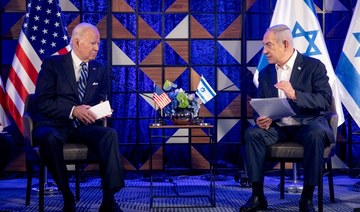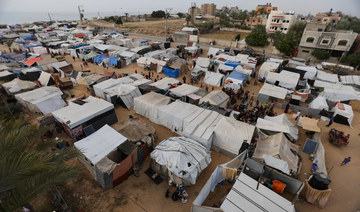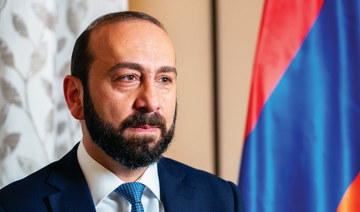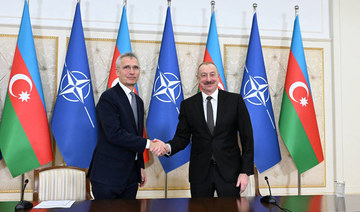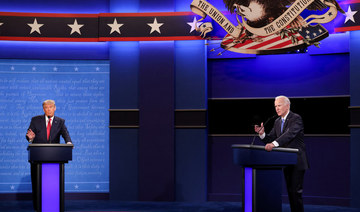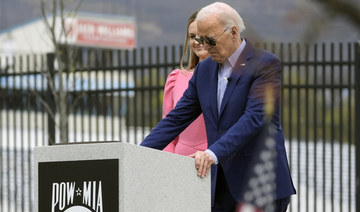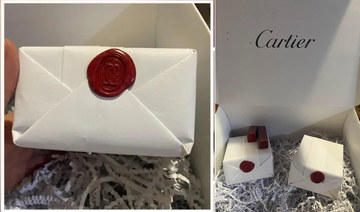BEIJING: China says it is not holding any Indian soldiers in the Himalayan border standoff between the two countries, but has not directly addressed media reports that China released 10 of them late Thursday.
“My information is that at present there are no Indian personnel detained on the Chinese side,” Foreign Ministry spokesperson Zhao Lijian said Friday, according to an English version of his daily briefing posted on the ministry website.
Earlier reports, based on the ministry’s simultaneous translation at the briefing, said that Zhao had said that China had not seized any Indian soldiers.
The later version posted on the ministry’s website leaves open the possibility that Indian troops were being held earlier.
Indian officials have denied that their soldiers were in Chinese custody.
The comments came as China continued to blame India for a recent military clash at the border that left 20 people dead on the Indian side. China has not said whether any of its soldiers died.
Zhao said that “the rights and wrongs ... are very clear and the responsibility rests entirely with the Indian side.”
He added that the two sides are in communication over diplomatic and military channels.
“We hope India will work with China to jointly maintain the long-term development of bilateral relations,” he said at the briefing.
Monday night’s confrontation in the Galwan Valley, part of the disputed Ladakh region along the Himalayan frontier, was the deadliest conflict between the sides in 45 years.
China says it is not holding Indian soldiers in Himalayas
China says it is not holding Indian soldiers in Himalayas
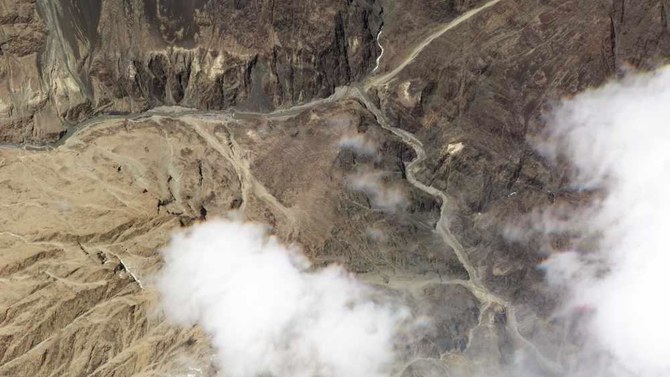
At least 13 Palestinians killed in Israeli strikes on Rafah, medical officials say
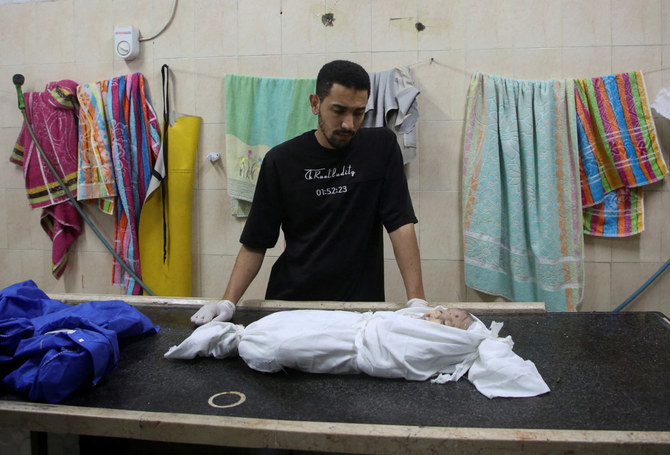
- The strikes came hours before Egypt was expected to host Hamas leaders to discuss prospects for a ceasefire agreement with Israel
- Mediators from Qatar and Egypt, backed by the US, have stepped up their efforts to conclude a deal as Israel threatened to invade Rafah
CAIRO: Israeli air strikes on three houses in the southern Gaza city of Rafah killed 13 people and wounded many others, medics said on Monday.
Hamas media outlets put the death toll at 15.
In Gaza City, in the north of the strip, Israeli planes struck two houses, killing and wounding several people, health officials said.
The strikes on Rafah, where over a million people are sheltering from months of Israeli bombardment, came hours before Egypt was expected to host leaders of the Islamist group Hamas to discuss prospects for a ceasefire agreement with Israel.
The war was triggered by an attack by Hamas militants on Israel on Oct. 7, killing 1,200 and taking 253 hostages, according to Israeli tallies.
Israel has vowed to eradicate Hamas, which controls Gaza, in a military operation that has killed more than 34,000 Palestinians, 66 of them in the past 24 hours, according to Gaza's health authorities. The war has displaced most of the 2.3 million population and laid much of the enclave to waste.
On Sunday, Hamas officials said a delegation, led by Khalil Al-Hayya, the group's deputy Gaza chief, would discuss a ceasefire proposal handed by Hamas to mediators from Qatar and Egypt, as well as Israel's response. Mediators, backed by the United States, have stepped up their efforts to conclude a deal as Israel threatened to invade Rafah.
Two Hamas officials who spoke to Reuters did not disclose details of the latest proposals, but a source briefed on the talks told Reuters Hamas is expected to respond to Israel’s latest truce proposal delivered on Saturday.
The source said this included an agreement to accept the release of fewer than 40 hostages in exchange for releasing Palestinians held in Israeli jails and to a second phase of a truce that includes a "period of sustained calm" — Israel’s compromise response to a Hamas demand for a permanent ceasefire.
After the first phase, Israel would allow free movement between south and north Gaza and a partial withdrawal of Israeli troops from Gaza, the source said.
A senior Hamas official told Reuters the Monday talks in Cairo will take place between the Hamas delegation and the Qatari and the Egyptian mediators to discuss remarks the group has made over the Israeli response to its recent proposal.
"Hamas has some questions and inquires over the Israeli response to its proposal, which the movement received from mediators on Friday," the official told Reuters.
Those comments suggested Hamas may not hand an instant response to mediators over Israel's latest proposal.
Blinken speaks to Azeri, Armenian leaders about peace talks
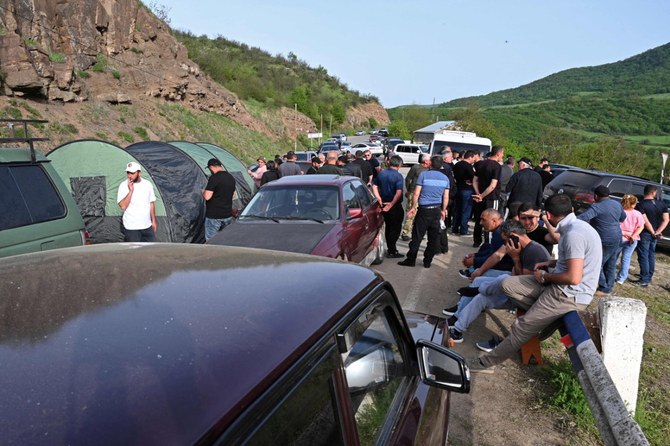
- Blinken reaffirmed Washington’s support for a peace treaty between the South Caucasus neighbors in separate calls with their leaders
- Azeri President Ilham Aliyev's press service later said Azerbaijan's FM will soon meet with his Armenian counterpart to continue negotiations
US Secretary of State Antony Blinken has spoken to the leaders of Armenia and Azerbaijan and reaffirmed Washington’s support for a peace treaty between the South Caucasus neighbors, the State Department said on Sunday.
Yerevan suffered a major defeat last September when Baku’s forces retook the region of Nagorno-Karabakh, which while part of Azerbaijan had a predominantly Armenian population.
Peace talks have become bogged down in issues including demarcation of the two countries’ 1,000-km (620-mile) border, which remains closed and heavily militarized.
Blinken spoke to Azeri President Ilham Aliyev on Sunday and urged him “to keep up the momentum with his Armenian counterpart, reiterating US willingness to support those efforts,” the State Department said in a statement.
Aliyev’s press service said on Sunday that foreign ministers of Azerbaijan and Armenia will soon hold a meeting in Almaty in Kazakhstan to continue negotiations.
“The president considers an important step that ... Azerbaijan and Armenia have begun the process of border demarcation,” Russia’s Interfax news agency cited the press service as saying.
In a separate call with Armenian Prime Minister Nikol Pashinyan, Blinken reaffirmed US support for progress on a durable and dignified peace agreement, the department said, but did not specify when the call took place.
In his call with Aliyev, Blinken also welcomed the transfer to house arrest last week of a prominent Azerbaijani economist and opposition politician who has been imprisoned since last July while awaiting trial.
Azerbaijan has also detained a string of independent reporters since late last year. Several are now facing trial on charges unrelated to journalistic activity, such as smuggling.
“Secretary Blinken again urged Azerbaijan to adhere to its international human rights obligations and commitments and release those unjustly detained in Azerbaijan,” the State Department said.
Donald Trump is running against Joe Biden. But he keeps bringing up another Democrat: Jimmy Carter
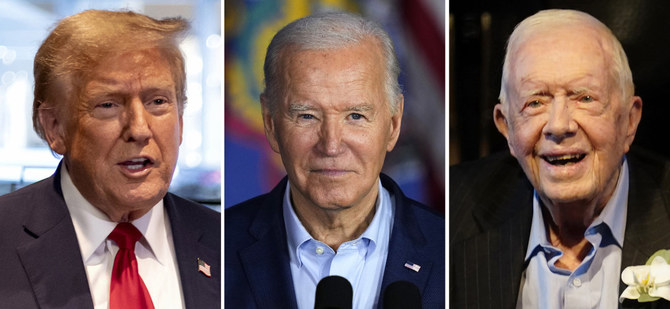
- Carter and Trump actually share common ground. Both were Washington outsiders who won the presidency, each fueled by voter discontent with the establishment
- But unlike Carter, Trump never accepted defeat. He falsely claimed the 2020 election was stolen and is accused of instigating violent efforts to overturn Biden's victory
ATLANTA: As Donald Trump campaigns for a return to the White House, he often reaches back more than 40 years and seven administrations to belittle President Joe Biden by comparing him to 99-year-old Jimmy Carter.
Most recently, Trump used his first campaign stop after the start of his criminal hush money trial in New York to needle the 46th president by saying the 39th president, a recently widowed hospice patient who left office in 1981, was selfishly pleased with Biden’s record.
“Biden is the worst president in the history of our country, worse than Jimmy Carter by a long shot,” Trump said in a variation of a quip he has used throughout the 2024 campaign, including as former first lady Rosalynn Carter was on her deathbed. “Jimmy Carter is happy,” Trump continued about the two Democrats, “because he had a brilliant presidency compared to Biden.”
It was once common for Republicans like Trump to lampoon Carter. Many Democrats, including Presidents Bill Clinton and Barack Obama, kept their distance for years, too, after a roiled economy, energy shortages and an extended American hostage crisis led to Carter’s landslide defeat in 1980. The negative vibes waned, though, with the passage of time and reconsideration of Carter’s legacy as a political leader, Nobel laureate and global humanitarian.
That leaves some observers, Democrats especially, questioning Trump’s attempts to saddle Biden with the decades-old baggage of a frail man who closed his public life last November by silently leading the mourning for his wife of 77 years.
“It’s just a very dated reference,” said pollster Zac McCrary, whose Alabama-based firm has worked for Biden. “It’s akin to a Democrat launching an attack on Gerald Ford or Herbert Hoover or William McKinley. It doesn’t signify anything to voters except Trump taking a cheap shot at a figure that most Americans at this point believe has given a lot to his country and to the world.”
Trump loyalists insist that even a near-centenarian is fair game in the rough-and-tumble reality of presidential politics.
“I was saying it probably before President Trump: Joe Biden’s worse than Jimmy Carter,” said Georgia resident Debbie Dooley, an early national tea party organizer during Obama’s first term and a Trump supporter since early in his 2016 campaign. Dooley said inflation under Biden justifies the parallel: “I’m old enough to remember the gas lines under President Carter.”
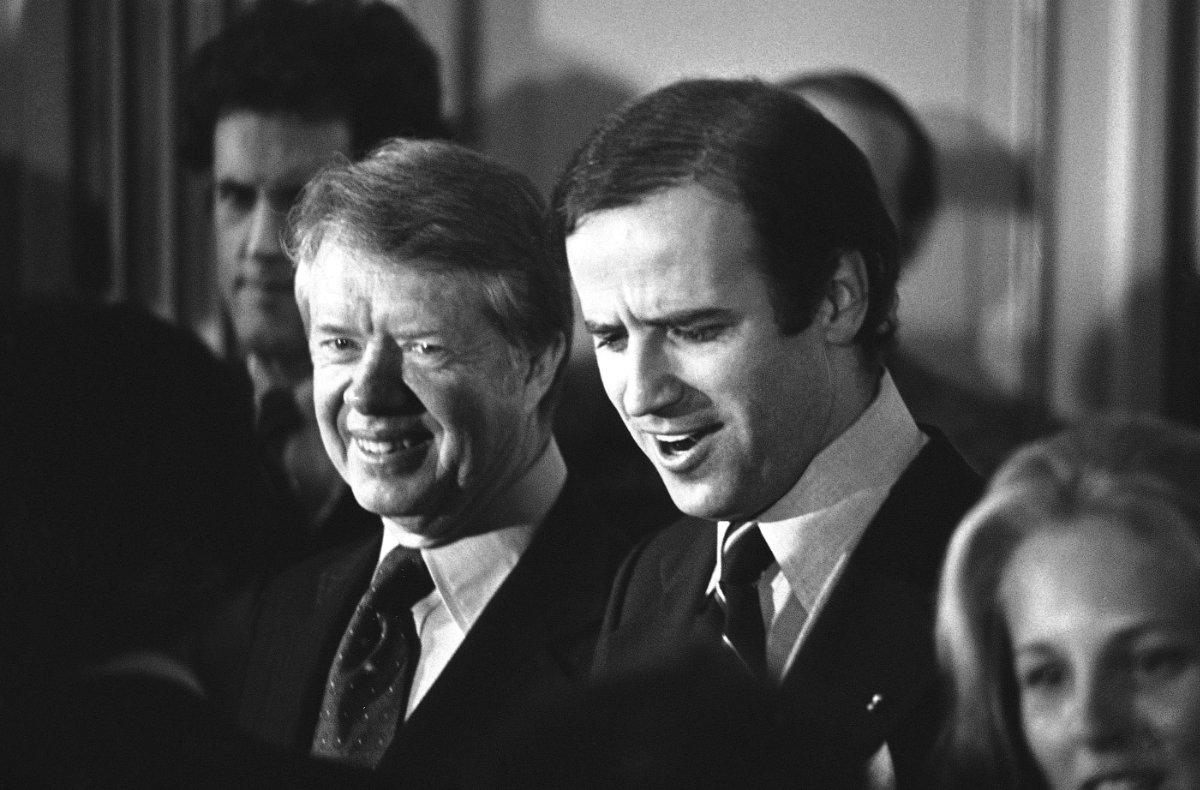
Any comparison, of course, involves selective interpretation, and Trump’s decision to bring a third president into the campaign carries complications for all three –- and perhaps some irony for Trump, who, like Carter, was rejected by voters after one term.
Trump’s campaign did not respond to a request for comment about his comparisons; Biden’s campaign was dismissive of them.
“Donald Trump is flailing and struggling to land coherent attacks on President Biden,” spokesman Seth Schuster said.
Carter remains at home in Plains, Georgia, where those close to him say he has kept up with the campaign. Biden is unquestionably the closest friend Carter has had in the White House since he left it. Biden was a first-term lawmaker from Delaware when he became the first US senator to endorse Carter’s underdog campaign. After he won the White House, Biden and first lady Jill Biden visited the Carters in Plains. They saw a grieving Carter privately before Rosalynn Carter’s funeral in Atlanta last year.
Like Carter, Biden is seeking reelection at a time when Americans are worried about inflation. But today’s economy is not the same as the one Carter faced.
The post-pandemic rebound, fueled by stimulus spending from the US and other governments, has been blamed for global inflation. The Federal Reserve has raised interest rates in response.
But the effective federal funds rate is 5.33 percent right now, while the benchmark was above 17 percent for a key period before the 1980 election. Rates for a 30-year mortgage are about half what they were at the peak of Carter’s administration; unemployment is less than half the Carter peak. The average per-gallon gas price in the US, topping $3.60 this month, is higher than the $3 peak under Trump. It reached $4.50 (adjusted for inflation) during Carter’s last year in office.
Carter and Trump actually share common ground. They are the clearest Washington outsiders in modern history to win the presidency, each fueled by voter discontent with the establishment.
A little-known Georgia governor and peanut farmer, Carter leveraged fallout from Vietnam and the Watergate scandal. Trump was the populist businessman and reality TV star who pledged to “Make America Great Again.” Both men defy ideological labels, standing out for their willingness to talk to dictators and isolated nations such as North Korea, even if they offered differing explanations for why.
Carter cautioned his party about underestimating Trump’s appeal, and the Carters attended Trump’s 2017 inauguration. Jimmy Carter, however, openly criticized Trump’s penchant for lies. After Carter suggested Russian propaganda helped elect Trump over Democrat Hillary Clinton in 2016, Trump began to insult Carter as a failure.
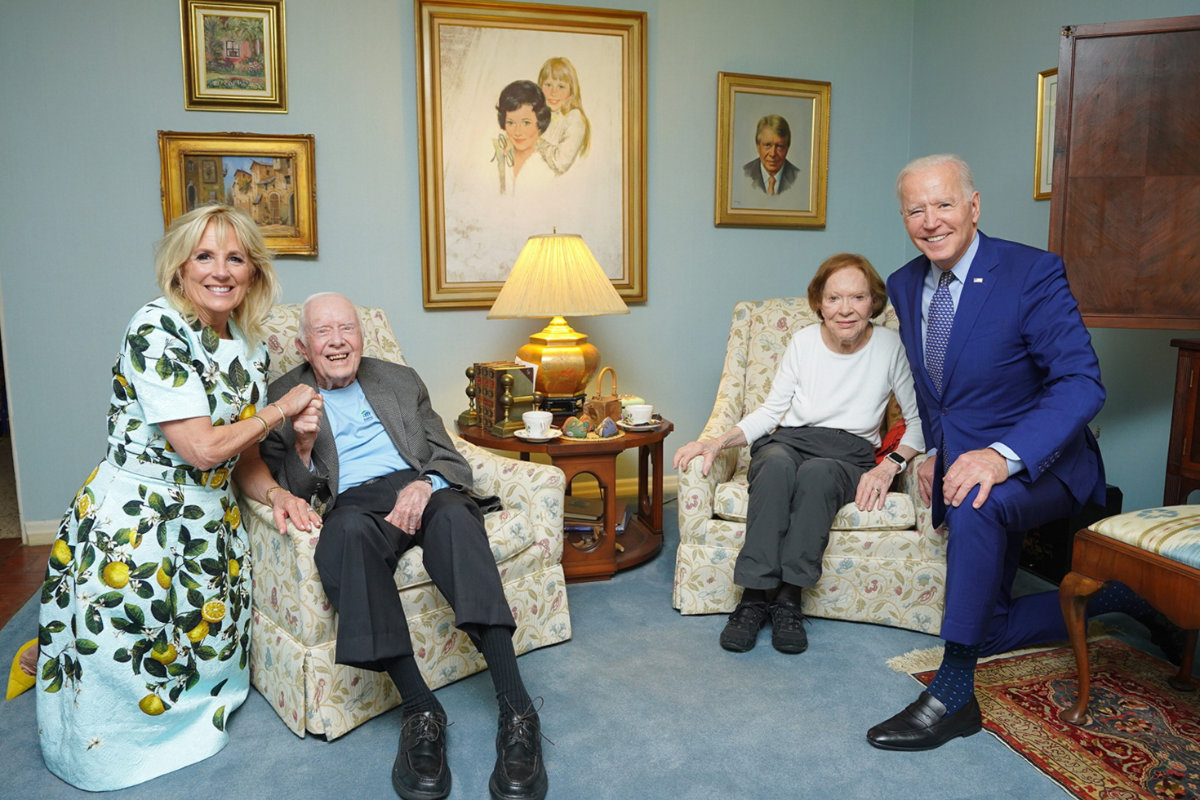
Unlike Carter, Trump never accepted defeat. He falsely claimed the 2020 election was stolen, then promoted debunked theories about the election that were repeated by supporters in the mob that stormed the US Capitol on Jan. 6, 2021, as Congress convened to certify Biden’s victory. Trump left Washington the morning Biden took office, becoming the first president since Andrew Johnson in 1869 to skip his successor’s inauguration.
Carter conceded to Republican Ronald Reagan, attended his inauguration, then returned to Georgia. There, he and Rosalynn Carter established The Carter Center in 1982. They spent decades advocating for democracy, mediating international conflict and advancing public health in the developing world. They built houses for low-income people with Habitat for Humanity. Jimmy Carter was awarded the Nobel Peace Prize in 2002.
Many historians’ judgment of Carter’s presidency has softened.
He is credited with deregulating much of the transportation industry, making air travel far more accessible to Americans, and creating the Department of Energy to streamline and coordinate the nation’s energy research. He negotiated the Camp David peace deal between Egypt and Israel. He diversified the federal judiciary and executive branch. He appointed the Federal Reserve chairman, Paul Volcker, who, along with Reagan, would get credit for the economic growth of the 1980s. Carter was the first president to raise concerns about rising global temperatures. And it was Carter, along with his diplomatic team, who negotiated the release of American hostages in Tehran, though they were not freed until minutes after Carter’s term expired.
Biographies, documentaries and news coverage across Carter’s 10th decade have reassessed that record.
By 2015, a Quinnipiac University poll found 40 percent of registered voters viewed Carter as having done the best work since leaving office among presidents from Carter through George W. Bush. When Gallup asked voters last year to rate Carter’s handling of his presidency, 57 percent approved and 36 percent disapproved. (Trump measured 46 percent approval and 54 percent disapproval at the time, the first retroactive measure Gallup had conducted for him.)
“There has long been a general consensus of admiration for Carter as a person — that sentiment that he was a good and decent man,” said Amber Roessner, a University of Tennessee professor who studies collective public memory and has written extensively on Carter. The more recent conclusions about Carter as a president, she added, suggest “we should consider Carter’s presidency as a lens to think about reevaluating about how we gauge the failure or success of any administration.”
How that plays into Biden’s rematch with Trump, Roessner said, “remains to be seen.”
Regardless, the ties between the 39th and 46th presidents endure, whatever the 45th president might say. When the time comes for Carter’s state funeral, Trump is expected to be invited alongside Carter’s other living successors. But it will be Biden who delivers the eulogy.
Morocco, Algeria dispute over shirts leads to second cancelation

- Before kick-off on Sunday, Renaissance supporters held up a banner with a map of Morocco showing the disputed territory. Many fans waved Moroccan flags
- The former Spanish colony of Western Sahara is largely controlled by Morocco but claimed by the Algeria-backed Polisario Front, which seeks the territory’s independence
BERKANE, Morocco: For the second straight week, an African Confederation Cup match between Renaissance Berkane and Algerian side USM Alger was canceled in a dispute over a map on the Moroccan team’s shirts.
The Confederation of African Football (CAF) awarded Berkane a 3-0 victory in the first leg of their semifinal, canceled last Sunday when the Moroccan club refused to take the field after Algerian officials confiscated their shirts.
On Sunday in Berkane, only the home players took the field and they saluted their fans as the stadium announcer told the crowd the match had been canceled.
Moroccan television reported that the USM team left the stadium just before the scheduled 1900 GMT kickoff.
The row began when the Moroccan squad arrived in Algeria last week ahead of the first-leg tie.
Customs officers confiscated Berkane’s shirts on the grounds that they carried a map of Morocco that included the disputed Western Sahara.
Shortly before the first leg kick-off, USM Alger sporting director Toufik Korichi told Algerian radio that the match would not be played because Berkane refused to take to the pitch in any other shirts
The former Spanish colony of Western Sahara is largely controlled by Morocco but claimed by the Algeria-backed Polisario Front, which seeks the territory’s independence.
Algeria broke off diplomatic relations with Morocco in 2021, partly over the issue.
Before kick-off on Sunday, Renaissance supporters held up a banner with a map of Morocco showing the disputed territory. Many fans waved Moroccan flags.
On Saturday, business was brisk in the official shop selling Berkane shirts.
“There’s a huge demand,” said Soufiane Al Korchi, a representative of the official distributor of the Moroccan team shirt, adding that the “map has been part of the official design for three years.”
The Algerian football federation has lodged an appeal against the CAF sanction with the Court of Arbitration for Sport in Lausanne, arguing that the Cairo-based body had “validated the request of the Moroccan club, RS Berkane, to wear a shirt with a political message.”
Palestinian prisoner in Israel wins top fiction prize
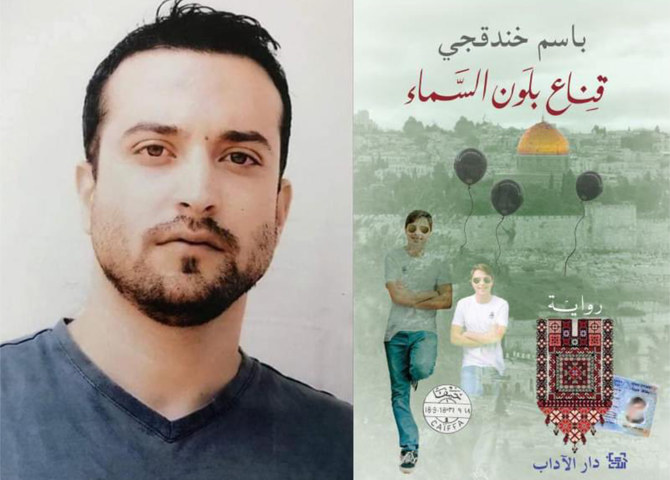
- The mask in the novel’s title refers to the blue identity card that Nur, an archaeologist living in a refugee camp in Ramallah, finds in the pocket of an old coat belonging to an Israeli
ABU DHABI: Palestinian writer Basim Khandaqji, jailed 20 years ago in Israel, won a prestigious prize for Arabic fiction on Sunday for his novel “A Mask, the Color of the Sky.”
The award of the 2024 International Prize for Arabic Fiction was announced at a ceremony in Abu Dhabi.
The prize was accepted on Khandaqji’s behalf by Rana Idriss, owner of Dar Al-Adab, the book’s Lebanon-based publisher.
Khandaqji was born in the Israeli-occupied West Bank city of Nablus in 1983, and wrote short stories until his arrest in 2004 at the age of 21.
He was convicted and jailed on charges relating to a deadly bombing in Tel Aviv, and completed his university education from inside jail via the Internet.
The mask in the novel’s title refers to the blue identity card that Nur, an archaeologist living in a refugee camp in Ramallah, finds in the pocket of an old coat belonging to an Israeli.
Khandaqji’s book was chosen from 133 works submitted to the competition.
Nabil Suleiman, who chaired the jury, said the novel “dissects a complex, bitter reality of family fragmentation, displacement, genocide, and racism.”
Since being jailed Khandaqji has written poetry collections including “Rituals of the First Time” and “The Breath of a Nocturnal Poem.”
He has also written three earlier novels.



